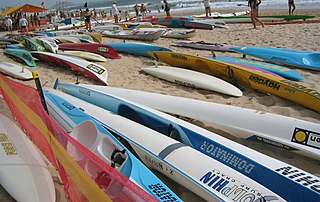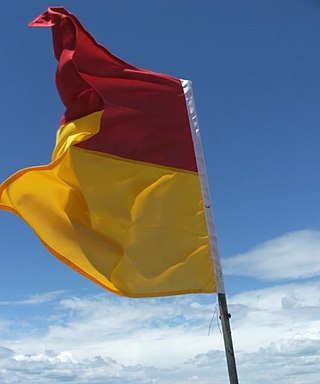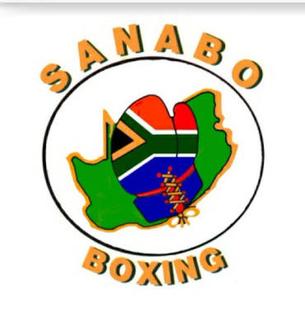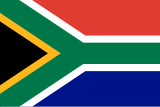
Surf lifesaving is a multifaceted social movement that comprises key aspects of voluntary lifeguard services and competitive surf sport. Originating in early 20th century Australia, the movement has expanded globally to other countries, including New Zealand, Ireland, South Africa, and the United Kingdom. Surf lifesavers in Australia are colloquially known as "Clubbies".

A lifeguard is a rescuer who supervises the safety and rescue of swimmers, surfers, and other water sports participants such as in a swimming pool, water park, beach, spa, river and lake. Lifeguards are trained in swimming and CPR/AED first aid, certified in water rescue using a variety of aids and equipment depending on requirements of their particular venue. In some areas, lifeguards are part of the emergency services system to incidents and in some communities, lifeguards may function as the primary EMS provider.

A surfski is a type of kayak in the kayaking "family" of paddling craft. It is generally the longest of all kayaks and is a performance oriented kayak designed for speed on open water, most commonly the ocean, although it is well suited to all bodies of water and recreational paddling.
The Royal Life Saving Society UK is a drowning prevention charity founded in 1891 in the UK. It has had Royal Patronage since 1904.

Surf Life Saving New Zealand (SLSNZ) is the national association representing 74 Surf Life Saving Clubs in New Zealand. The organisation's motto is 'In it for Life'. This refers to both the long relationship many members have with the organisation, as well as to the organisation's purpose of preventing drowning and injury, thereby saving lives.

The International Life Saving Federation (ILS) is an organisation for drowning prevention, water safety, lifesaving and lifesaving sports.

Surf Life Saving Australia (SLSA) is an Australian not-for-profit community organisation that promotes water safety and provides surf rescue services.

Lifesaving is the act involving rescue, resuscitation and first aid. It often refers to water safety and aquatic rescue; however, it could include ice rescue, flood and river rescue, swimming pool rescue and other emergency medical services. Lifesaving also refers to sport where lifesavers compete based on skills, speed and teamwork. Lifesaving activities specialized in oceanic environment is called surf lifesaving or coastal lifesaving.
The Royal Life Saving Society - Commonwealth is the umbrella organisation that links together lifesaving societies in the Commonwealth of Nations. The RLSS-Commonwealth organises the Commonwealth Lifesaving Championships. The Society hosts the Quinquennial Commonwealth Conference and Lifesaving Championships.
The ILS World Life Saving Championships are the world championships for lifesaving sport events. They are sanctioned by the International Life Saving Federation (ILS), conducted every 2 years, and formerly marketed and known as the ‘Rescue’ series, for example – Rescue 2008.
The Surf Life Saving Association of Wales (SLSAW) is the national governing body of surf lifesaving in Wales. It is a voluntary, not-for-profit, registered charity organisation. Its goal is "to prevent the loss of life through drowning". The SLSAW organise regional and national competitions—such as the SLSA Wales Stillwater Leagues and the SLSA Wales Ocean Masters Championships – and select and manage the Wales squad for international events, including the Celtic Challenge Cup.

Surfing South Africa (SSA) is the governing body for the sport of surfing in South Africa, and a recognised member of the world governing body, the International Surfing Association (ISA). SSA is also an affiliate of the South African Sports Confederation and Olympic Committee (SASCOC), which, alongside Sport and Recreation South Africa (SRSA) supervises all organised sport in South Africa.

South African National Boxing Organisation (SANABO) is the organisation that governs boxing (or olympic style boxing) for men and women in South Africa. South African National Boxing Organisation is affiliated to the International Boxing Association (AIBA), along with the African Boxing Confederation (AFBC). SANABO is also affiliated to the South African Sports Confederation and Olympic Committee (SASCOC), and Sport and Recreation South Africa (SRSA). It organises national competitions such as the SANABO Elite National Championships and the SANABO Boxing League.

South African Shooting Sport Confederation (SASSCo) formerly known as South African Shooting Sport Federation (SASSF) is the governing body for shooting sports in South Africa. SASSCo is the highest body responsible for the development and promotion of target shooting sports in South Africa. SASSCo is registered with both SASCOC and Sport and Recreation South Africa (SRSA) as the officially recognised overall federation for shooting sports in South Africa, and is also affiliated to the International Shooting Sport Federation (ISSF) and the African Shooting Sport Federation (ASSF).

The South African Wushu Federation (SAWF) is the national governing body for the development and promotion of the sport of wushu also known as kung fu in South Africa. The Federation was formed in 2002.

The Tenpin Bowling Association of South Africa (TBASA) is the recognised official governing body of the sport of ten-pin bowling in South Africa. It is the sanctioning body recognised by World Bowling, the sport's world governing body to organise competitions in South Africa, and is responsible for the growth and development of the sport. It is also affiliated to European Tenpin Bowling Federation, Commonwealth Tenpin Bowling Federation, as well as SASCOC. TBASA is responsible for the award of official coaching qualifications for the sport in South Africa.
South African National Climbing Federation(SANCF) is the governing body for competition climbing, involving competition lead climbing, competition bouldering and competition speed climbing in South Africa. SANCF oversees competitive climbing across the country as well as the promotion and development of the sport in artificial climbing environments. SANCF is affiliated to the world body International Federation of Sport Climbing (IFSC) with full member status, and SASCOC.

DanceSport South Africa (DanceSport SA) (DSSA), formerly the Federation of Dance Sport South Africa (FEDANSA), is the governing body for dancesport and related dance styles in South Africa. It is an full member of the world governing body World DanceSport Federation (WDSF) and recognised by SASCOC. DanceSport SA is the sole custodian and controlling body of organised dancesport in South Africa.

Lifesaving is an official discipline of the World Games, the Games with all the sports, recognized by the IOC but not yet in the Olympic program.















